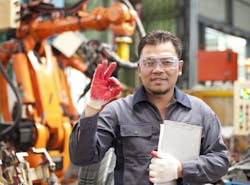It’s always interesting to hear the predictions of how many Internet of Things (IoT) devices will infiltrate our environment in the future. Gartner has projected that there will be 21 billion “things” connected by 2020. And while many applications will be in the specialized vertical space—connecting medical equipment in healthcare or tracking products in container ships, for example—the majority will be consumer-oriented endpoints and cross-industry generic devices that include building management systems, HVAC and lighting.
Still, there are also many reasons for manufacturers to adopt the Industrial Internet of Things (IIoT). From energy management to operational efficiency and predictive maintenance, IIoT could save a company a lot of money. But manufacturers are a conservative bunch, and they can be a bit timid when it comes to upgrading to new technology. So if the industry as a whole is going to embrace this new uncharted territory, we need a champion of change.
I would argue that the group who could make the biggest impact and influence a total transformation toward IIoT is not a company’s IT or OT team, and it is not the automation suppliers or the IoT technology vendors. It is the system integrators.
Unfortunately, the integrators that you’ve come to rely on to install your automation and industrial control systems (ICS) are not particularly IIoT-savvy. Nor, it seems, do they want to be. My colleague, Aaron Hand, attended the CSIA Executive Conference this past April, and walked away with new insight into the disconnect between integrators and end users—and even the automation suppliers who are looking to their partners to facilitate the deployment of new IIoT offerings. But the integrators just aren’t there yet.
In Hand’s article, he highlights the pleas of a few pharmaceutical executives who are asking for help from integrators with regulatory compliance and IIoT deployments. One system integrator specializing in the life sciences, food and beverage and building automation industries acknowledged that the integrator community should take a closer look at what they can do for customers to help with IIoT initiatives (which confirms that they are not).
I heard similar conversations when I attended CSIA last year. My takeaway is that integrators are focused on their automation expertise—which is important. But, like their customer counterparts, they are hesitant to jump on the IIoT bandwagon. Why? I’m not sure, because it’s certainly not a technology trend that will disappear in a year.
As the automation integrators drag their feet on IIoT, it opens the door to a new kind of integrator—integrators that specialize in smart devices in the commercial and residential sectors, and who are ready to move into manufacturing.
CytexOne is one of those companies. The company started as an IT-managed service provider, designing infrastructure and cloud services for the financial industry. About 10 years ago, CytexOne moved into servicing the “smart home” with wireless technology, cameras and sensors to improve energy efficiency, access control and automated lighting, for example. The business quickly evolved to smart commercial buildings, hospitality, and just this week they announced a new industrial manufacturing practice.
Each time CytexOne enters a new market, it sees the same resistance from existing integrators, according to Dan Levine, CEO and co-founder. “Whether residential, commercial, hospitality or industrial, most integrators have been doing what they do for 30 years and know everything,” he says. “But they don’t know networking and TCP/IP. So it is a big scary world that is coming in and they don’t see the benefit.”
That’s surprising, Levine says, given the Industry 4.0 movement. “I’m shocked that it hasn’t been deployed everywhere,” he says, noting it would be easy to set up ZigBee-based detection mechanisms across the factory floor that would allow independent subsystems to talk to each other. “To us, it’s just another data point. And when you start making the technology work together, the data you collect becomes more valuable.”
CytexOne will enter the manufacturing space with the low-hanging fruit, which is controlling the building environment, aggregating information and offering a remote monitoring and management service. As manufacturers become more comfortable with its IIoT offerings, and as the digital transformation penetrates the plant floor, CytexOne will be there, ready to partner with automation suppliers and industrial control system integrators. The question is, will the ICS integrators be ready, too?

